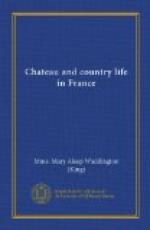We had a very cheerful dinner. We complimented the Abbe upon his sermon, which was really very pretty and poetical. He said the children’s faces quite inspired him, and beyond, over their heads, through the open door he got a glimpse of the tall pines with their frosted heads, and could almost fancy he saw the beautiful star.
We were all much pleased with our first “Christmas in the Valois.”
VII
A RACINE CELEBRATION
MAREUIL-SUR-OURCQ, April 20th, 1899.
I could scarcely believe I was in our quiet little town of La Ferte-Milon to-day. Such a transformation—flags flying, draperies at all the windows, garlands of greens and flowers across the streets, and a fine triumphal arch—all greens and flowers arranged about the centre of the Grande Rue. Many people standing about, looking on, and making suggestions; altogether, an air de fete which is most unusual in these sleepy little streets where nothing ever passes, except at four o’clock, when the three schools come out, and clatter down the street. The Ecole Maternelle comes first, the good Mere Cecile bringing up the rear of the procession, holding the smallest children, babies three and four years old, by the hand, three or four more clinging to her skirts, and guiding them across the perilous passage of the bridge over the canal. It is a pretty view from the bridge. The canal (really the river Ourcq, canalisee), which has preserved its current and hasn’t the dead, sluggish look of most canals, runs alongside of the Mail, a large green place with grass, big trees, a broad walk down the centre, and benches under the trees. It is a sort of promenade for the inhabitants and also serves as a village green, where all the fairs, shows and markets are held. The opposite bank is bordered by quaint old houses, with round towers and gardens, full of bright flowers, running down to the water’s edge. There is one curious old colombier which has been there for centuries; near the bridge there is a lavoir, where there are always women washing. They are all there to-day, but much distracted, wildly interested in all that is going on—and the unwonted stir in the streets; chattering hard, and giving their opinions as to the decoration of the arch, which is evidently a source of great pride to the town.
On a bright sunny day, when the red roofs and flowers are reflected in the water, and it is not too cold, their work doesn’t seem very hard; but on a winter afternoon, when they have to break the ice sometimes, and a biting wind is blowing down the canal, it is pitiable to see the poor things thinly clad, shivering and damp; their hands and arms red and chapped with cold. On the other side of the bridge, the canal wanders peacefully along through endless green meadows, bordered with poplars, to Marolles, a little village where there is the first ecluse on the way to Paris.




